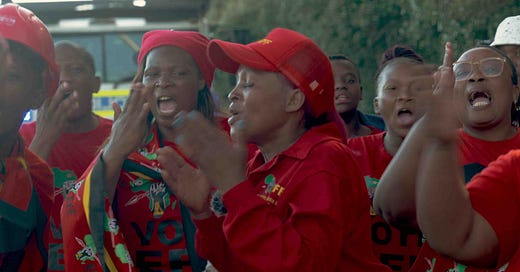Dear Friends of South Africa,
In this newsletter, we explore the controversial "Kill the Boer" song, its origins in the apartheid era, the legal battle that led to its modification, and the implications of its continued use in South Africa's political landscape. We'll also discuss the broader context of land reform and tensions surrounding land ownership, providing insights, personal observations, and video evidence from a recent EFF protest.
As you may know, I have been following an EFF activist group in preparation for and during the national shutdown protest on the 20th of March 2023. During this time, I was somewhat surprised to find that the activists continued to sing the controversial "Kill the Boer" song, albeit with a key modification: they replaced the word "kill" with "kiss."
The term "Boer" has historical connotations, referring to Dutch descendants and Afrikaans-speaking white farmers who were targets of resentment and violence from black resistance movements during the apartheid era.
The Origins of the "Kill the Boer" Song
The "Kill the Boer" song has its roots in the apartheid era. Initially sung as a resistance anthem, it has since evolved into a contentious symbol of political struggle. It is worth noting that some white farmers, including the Boers, have owned their farmlands since the 17th century. This historical context adds complexity to the land reform debate in South Africa, as it intertwines with the song's message and the demands for land expropriation without compensation.
The Legal Battle and the Change to "Kiss the Boer"
In 2011, the South African Equality Court ruled that the "Kill the Boer" song constituted hate speech and was therefore unconstitutional. This legal action was initiated by AfriForum, which argued that the song's lyrics incited violence against white South African farmers, especially the Afrikaners. Consequently, singing the song in public became illegal in South Africa. To circumvent the legal restrictions, the EFF and Julius Malema started using the modified "Kiss the Boer" version instead.
The Implications of the Modified Song
Despite the change in lyrics, it is evident from the activists' use of pistol-shaped hand gestures and gunshot sounds that the original message of the song remains intact. It seems clear that the EFF is mocking the legal situation and attempting to maintain the spirit of the original song as a form of protest, with an underlying threat of violence.

The Video Evidence
I have attached a video of the EFF activists singing the modified version of the song during the recent protest. This footage demonstrates the continued use of the song and its potential implications in South Africa's political landscape.
The EFF's continued use of the modified "Kill the Boer" song is emblematic of the party's broader political agenda, which includes advocating for the policy of "Land Expropriation Without Compensation." This policy has also gained support from the ruling ANC party.
Land has always played a central role in socialist political movements like the EFF and ANC, and the issue of land has been a key question in other African countries during the decolonization period. Land ownership remains a potent symbol of power. In some instances, the struggle for land and the targeting of white landowners have led to violence and even large-scale killings, as seen in Congo, Zimbabwe, and other parts of Africa.
In South Africa, white farmers continue to face significant pressure and danger due to ongoing tensions over land ownership. Farm attacks, often involving theft and violence, have made farming one of the most dangerous professions in the country. As a result, farmers are forced to invest heavily in security measures to protect themselves, their families, and their property. This constant state of alert takes a toll on the farming community, as they must balance the demands of agricultural production with the need for safety and security.
New Mini-Documentary: Uncovering South Africa's Farm Murder Crisis 🇿🇦🌾
Watch now (7 min) | Greetings, I'm excited to share with you my latest mini-documentary, in which we explore the heart-wrenching Plaasmoorde Monument, a symbol of the ongoing farm murder crisis in South Africa. Throughout this emotional journey, we meet Chris, the monument's dedicated caretaker, who provides us with invaluable insights into the lives of the farmers and thei…
The land question is a deeply emotional issue in South Africa. A large part of the vast black majority looks at each other and sees that they own nothing, and then gazes with resentment at the white minority farmer community. They search for solutions to their own poverty in someone else's property, singing the song of killing the Boer and implementing political decisions to take white farmers' land without compensation.
In conclusion, the "Kiss the Boer" song serves as a symbol of the EFF's defiance and commitment to its political message. Although the change in lyrics allows the party to avoid legal repercussions, it is evident that the original message of the song has not been lost. The use of the word "kiss" as a mocking gesture is likely to further exacerbate tensions within South Africa.
Thank you for your continued support, and I hope you find this newsletter informative. Stay tuned for more updates on the mini-documentary about the EFF that I am currently working on.
Remember, if you want to help us grow, you can either share this newsletter or consider upgrading your subscription to become a paying member.
Best regards,
Jonas Nilsson






Share this post